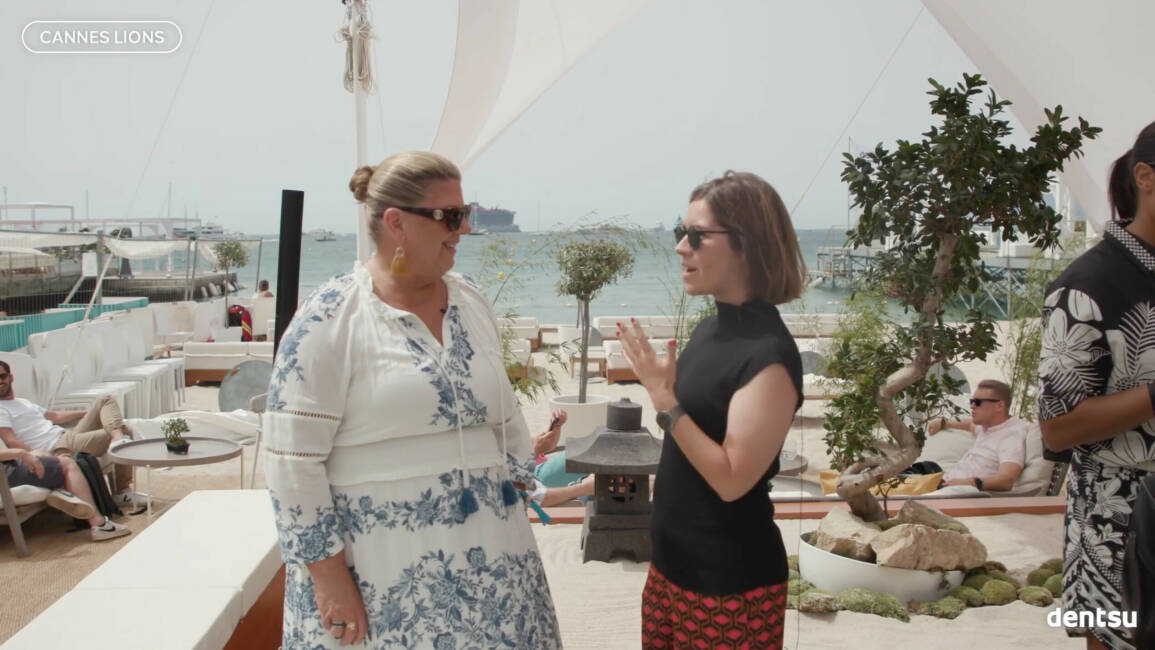thursday 22 june
Highlights
Scroll down
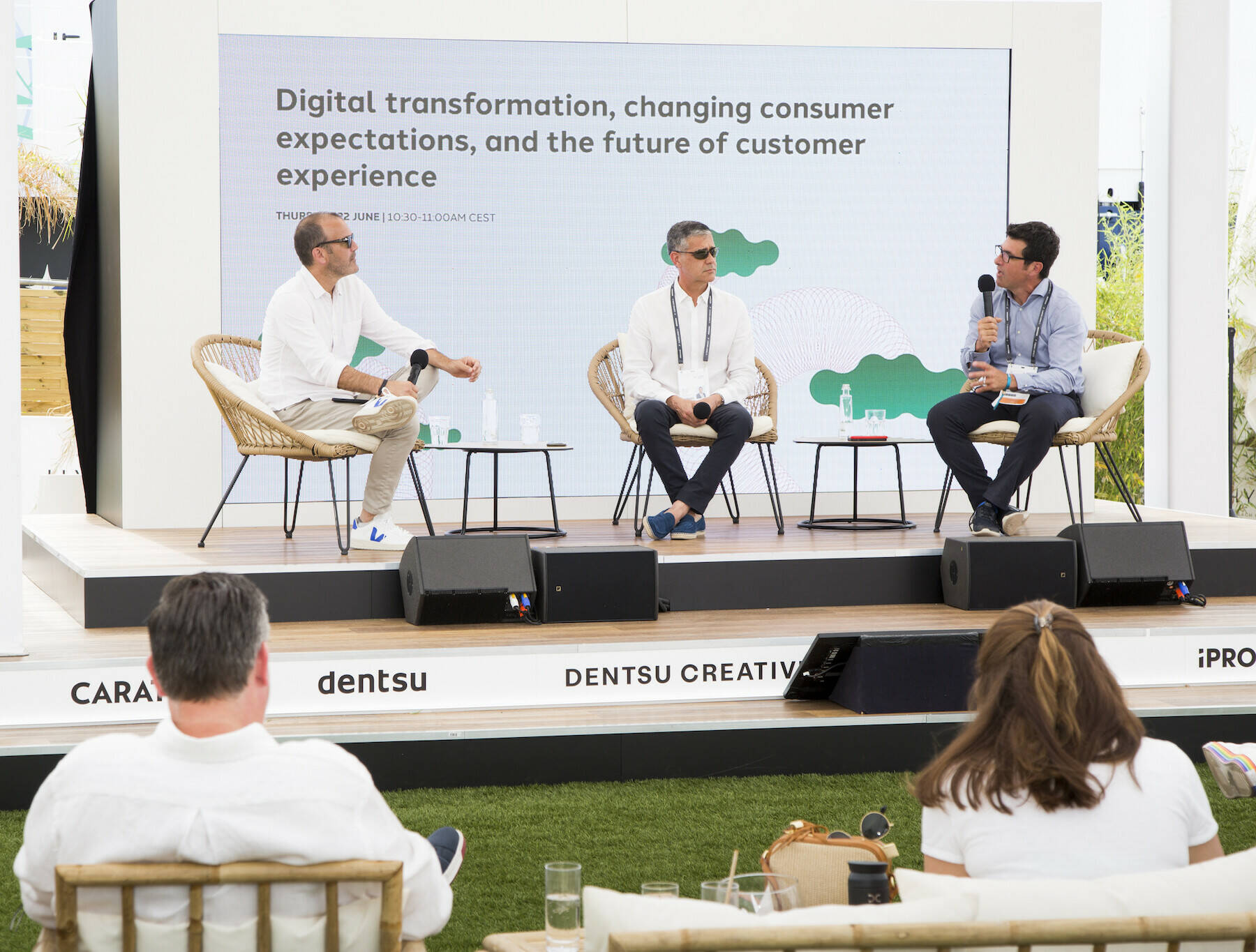
Recap
Recordings
Client connect
Gallery



Addressing a Wider Sustainability Mandate
A fresh off the presses dentsu Consumer Navigator report shows that the definition of ‘sustainability’ is broadening.
In the early days of the digital revolution sustainability was perceived to be less of a priority. Now that sustainability transformation has, in a way, replaced digital transformation as the primary shift businesses are evolving to enable, purpose-driven brands are pivoting to a ‘digital for good’ mindset. Cannes Lions celebrated a great example of ‘digital for good’ this year, Lay’s ‘Smart Farm’, which was awarded a Bronze Lions in Innovation. Extreme and unpredictable weather conditions brought to bear by climate change are posing a threat to Indian agriculture, forcing farmers to inspect crops daily – an impossible task. As a contracting partner to over 27,000 farms in India Lay’s created a platform that uses satellite imagery, 4 years of data from 3,000 hectares of land and AI to deliver to farmers an early warning sign application they can easily consult on their mobile phones. It’s estimated that the solution reduced crop pandemic threats by 80%.
For instance, 37% of Gen Zers associate “addressing mental health” to sustainability, while only 15% of Boomers do so. Cannes Lions is an opportunity for marketers to come together and not only celebrate the creative work that will hopefully inspire new, more sustainable consumer behaviors, but also look inwards and evaluate their own practices within the marketing and advertising supply chain in light of this new, broader definition of the industry’s sustainability mandate. As it was remarked in a dentsu Beach House session titled ‘Growth through Good: How Sustainable Business Practices Drive Growth’, sustainability is the new digital, in the sense that it’s the most important innovation opportunity at hand for brands and society today. The three core pillars of this wider sustainability mandate (and opportunity) that emerged from various discussions among industry leaders this week are: the need to shape a more environmentally sustainable world, the need to empower the rise of a more fair and open society, and the need to use the power of digital technologies for good.
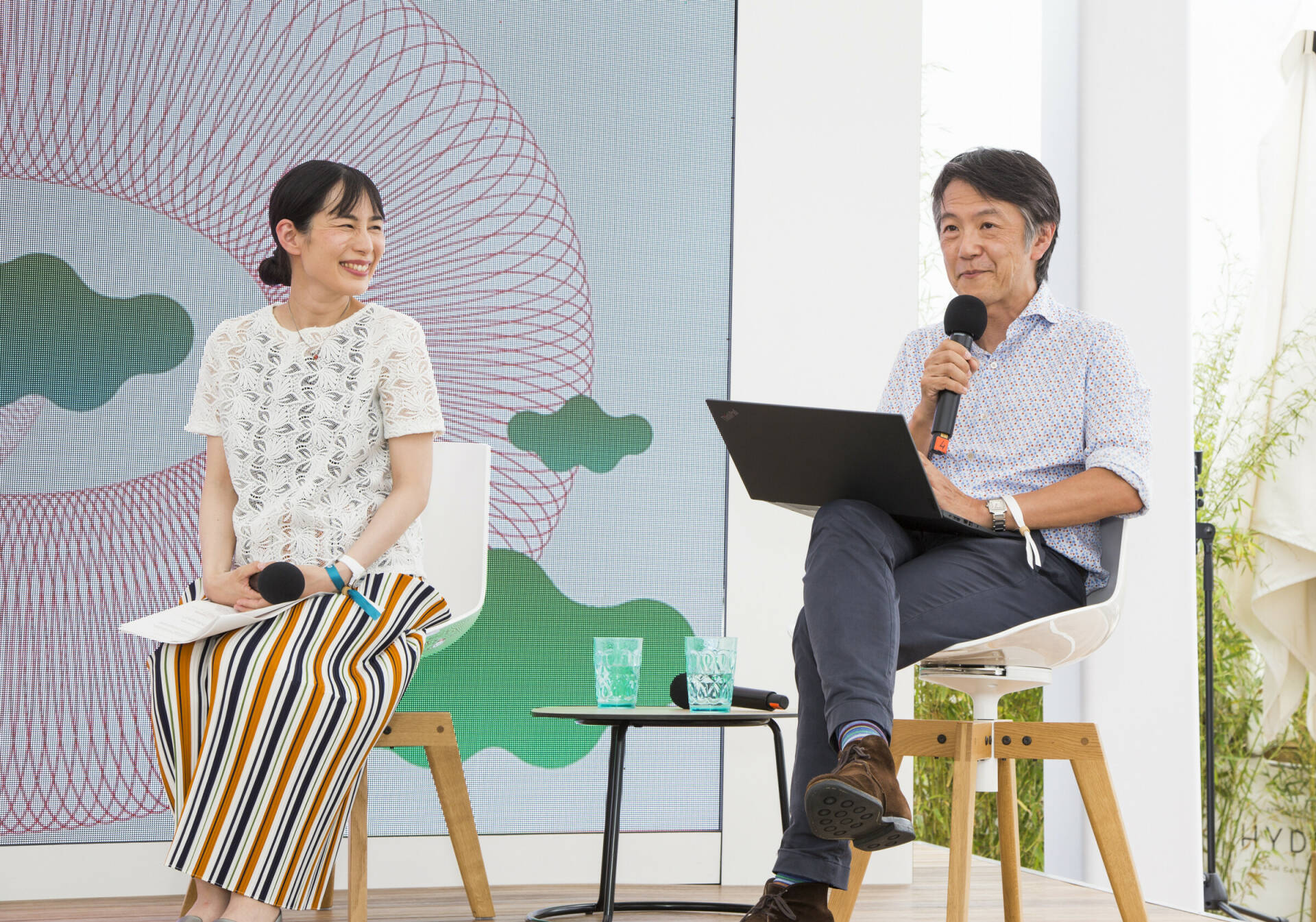
When it comes to shaping a more sustainable world by engendering behaviors that preserve and regenerate our planet’s natural resources, a dentsu and Kantar research report focused on consumers in Asia Pacific found that while 98% of respondent said they are prepared to take action to live a more sustainable lifestyle, only 17% of them said they are actively changing their behaviors accordingly. It’s apparent that brands’ considerable sphere of influence needs to be used to drive behavior changes that close this intention-to-action gap that exist among consumers. Solar Impulse’s ‘Pret-a-Voter’, which was awarded Gold Lions in both the Print & Publishing and in the Direct categories, is a great example of closing this gap. This French NGO observed that, while there is no shortage of debate around the criticality of environmental sustainability among politicians, the legislative process is so cumbersome that seldom sufficient action is taken in time to address these issues. They thus produced a book where 50 environmental solutions were drafted as laws ready to be voted upon in the National Assembly and sent it to all its 577 members. Some of these resolutions have already been approved and others are in the Assembly’s forthcoming agenda.
Inequities in society exacerbate the crises the population faces at both a local and global level, including the environmental crisis. Dentsu and Nikkei inc. – the largest financial newspaper in the world - partnered with Harvard, Oxford, and Tokyo University to develop a transformative new way to measure a country’s growth, the Well-Being Index (GDW), taking into account indicators like employment, wages, work-life balance, housing, health, education, social connections, the natural environment, and the ease of raising children. The development of a more fair and open society requires a measurement tool to benchmark against and the GDW, used alongside the GDP, can help governments and companies make informed decisions while structuring their investments and policies. The Well-Being Index project also shows just how much an ecosystem approach is required to make significant strides in the sustainability agenda. The ’Well-Being Index’ was awarded a Gold Lions in the Business Transformation category.
Other insights
While the ‘Metaverse’ was the buzzword at Cannes in 2022, AI has by and large dominated every conversation this year. However, the two are not really in competition with each other since immersive experiences are at the same time the ‘what’ and the ‘where’ that define the trajectory consumer engagement is evolving towards, while on the other hand AI is a tool, a ‘how’ that can be applied to accelerate development in a number of fields, including the development of immersive experiences. In a Palais session titled ‘Building the Next Iteration of the Internet’, LEGO and Epic Games, publishers of Fortnite, teased aspects of their partnership centered around using Epic’s Unreal Engine technology to create virtual LEGO branded environments focused on establishing a kids friendly standard for the next iteration of digital experiences, honing in on age-gating, a commitment to steer away from ‘pay-to-win’ tactics that are in contrast with their ambition to democratize creativity, and an investment in deep content moderation and parental controls. The fruits of their collaboration will be open – as a point of reference, already today 40% of the content on Fortnite is created by users, rather than by Epic Games – and interoperable with other platforms. Immersive experiences continue to be one of the most powerful brand community-building opportunities out there – but communities need ‘heritage’, whether it’s rooted in history or in mythology. This insight is at the heart of Clash of Clans’ ‘Clash from the Past’, a campaign that was awarded the Grand Prix in Entertainment. The campaign revolves around a mockumentary developed to celebrate the mobile game’s fictional 40th anniversary, when in fact the game is only 10 years old. This ignited a series of activations paying homage to ‘vintage’ gaming aesthetics and reimagining the brand in the context of 80s, 90s, and early 2000s culture and business.
Building Brand Communities Through Immersive Experiences

Decision-making in Commerce, From Thoughtful to Thoughtless
We no longer go shopping, we are always shopping. Which means that shopping needs to be constantly optimized to become better integrated with other aspects of our lives, from our socio-economic context to our ability to manage time and redirect more of our attention to entertainment and other meaningful activities rather than ‘tactical’ actions needed to move across the funnel. While consumers appreciate having options to choose from, too much variety can become a roadblock in this process of integration. While originating in very different contexts, two examples of award-winning work at Cannes this year converged on the notion of simplifying commerce decision making: dentsu and SkipExpressLane’s ‘The Inflation Cookbook’, which was awarded a Silver in the Mobile category and a Bronze in the Data category, is a grocery shopping tool that predicts price drops and generates recipes, developed to help budget-conscious Canadians make thoughtful decisions as they navigate price volatility in an uncertain economic environment.
On the other hand, Hungerstation’s ‘The Subconscious Order’ uses eye-tracking and AI to enable this mobile app to create a food order based on our subconscious mind, which is capable of processing things 500,000 times faster than our conscious mind. The goal is to spare consumers choice overload and losing as many as 132 hours per year scrolling through various restaurant menus. ‘The Subconscious Order’ was awarded the Grand Prix in Creative Commerce.
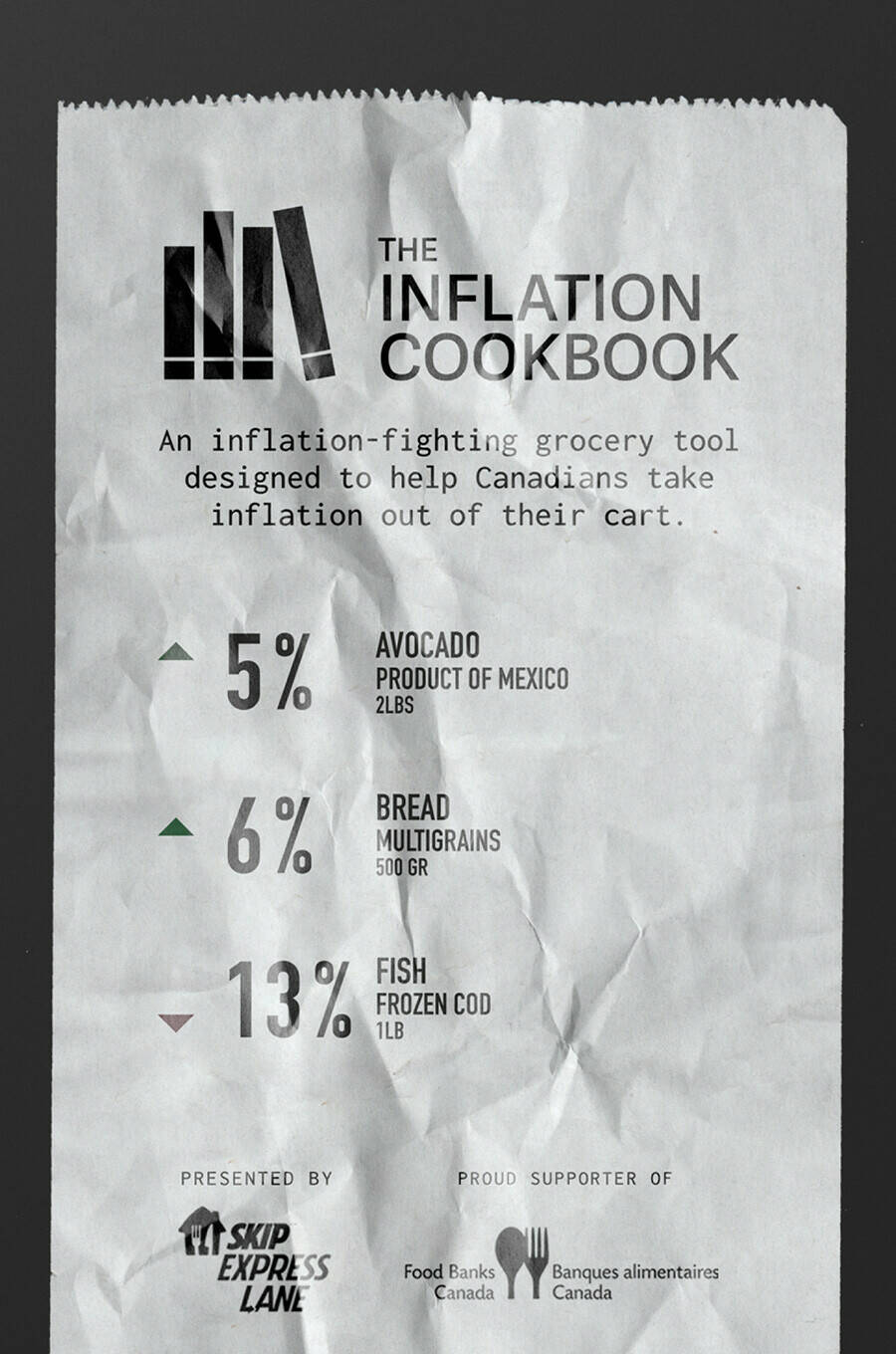
Moderator:
Abbey Klaassen, President, New York, Dentsu Creative
Speakers:
Marissa Jarratt, EVP & Chief Marketing & Sustainability Officer, 7-Eleven
Riccardo Fregoso, Chief Creative Officer, Italy, Dentsu Creative
Jacob Navok, Founder & CEO, Genvid Technologies


video
How brands are connecting with audiences through joy and humour
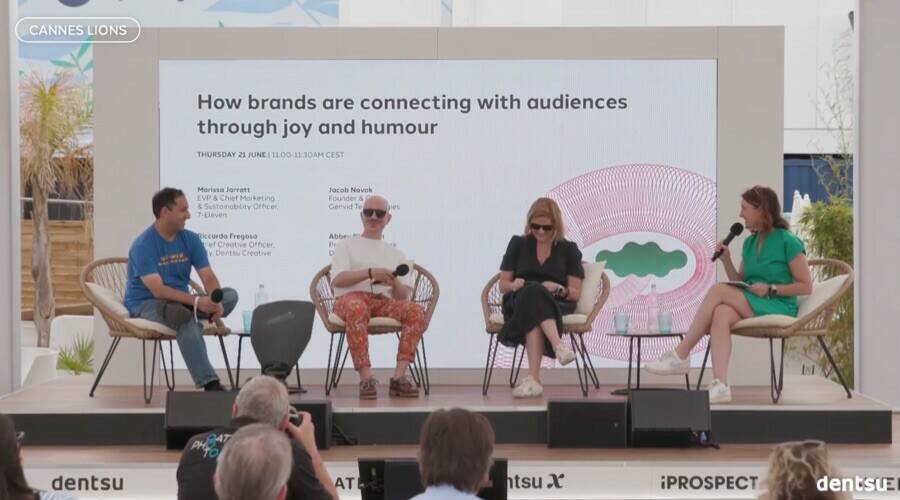
Watch our sessions in full and experience the insightful conversations with our people, partners and clients.
Panel session recordings
Moderator:
Jean Lin, Global Chief Culture Officer, Dentsu Group Inc & SDG Cannes Lions, Jury President
Speakers:
Manabi Sato, A project member of Well-being Initiative, Nikkei Inc.
Naoshi Takatsu, Managing Partner (Northeast Asia), IMD


video
Growth through good: How sustainable business practices drive growth
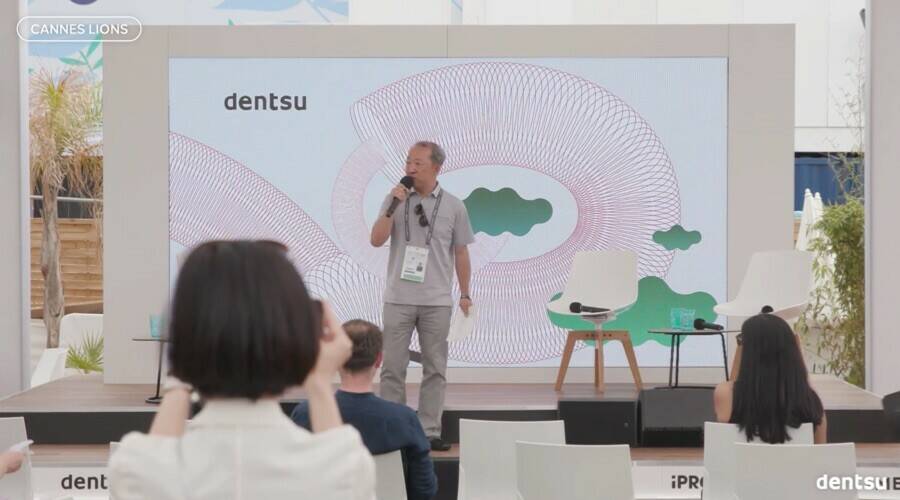

Gallery


Back to top



Back to top
Moderator:
Jean Lin, Global Chief Culture Officer, Dentsu Group Inc & SDG Cannes Lions, Jury President
Speakers:
Manabi Sato, A project member of Well-being Initiative, Nikkei Inc.
Naoshi Takatsu, Managing Partner (Northeast Asia), IMD


video
Growth through good: How sustainable business practices drive growth
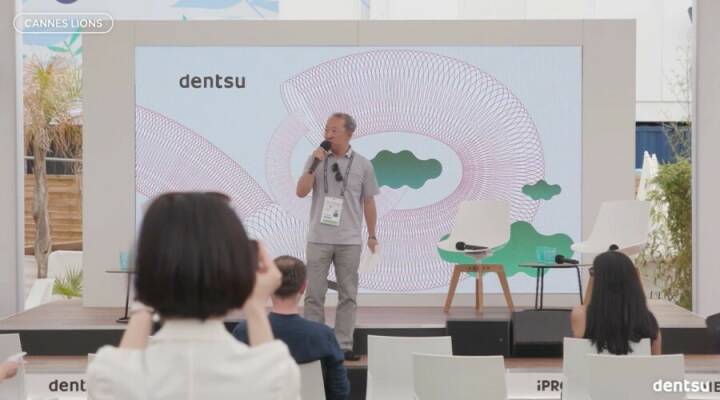
Moderator:
Abbey Klaassen, President, New York, Dentsu Creative
Speakers:
Marissa Jarratt, EVP & Chief Marketing & Sustainability Officer, 7-Eleven
Riccardo Fregoso, Chief Creative Officer, Italy, Dentsu Creative
Jacob Navok, Founder & CEO, Genvid Technologies


video
How brands are connecting with audiences through joy and humour
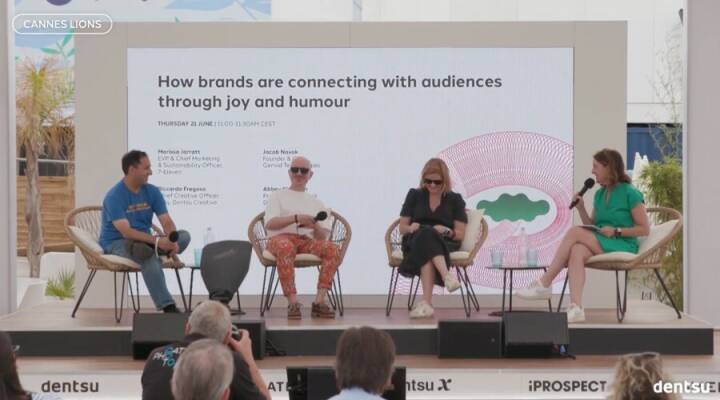
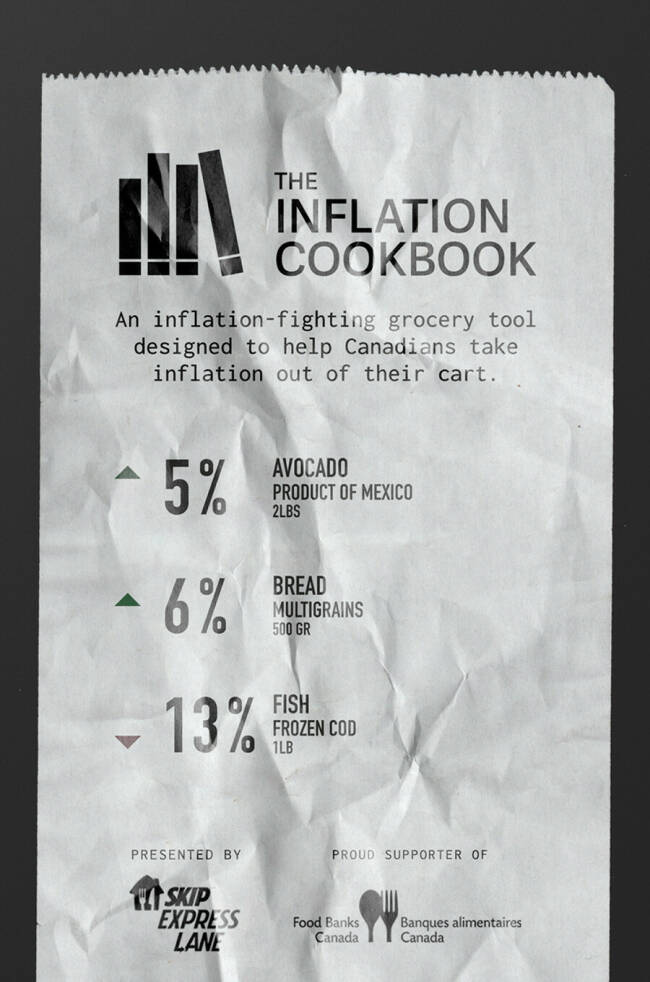
On the other hand, Hungerstation’s ‘The Subconscious Order’ uses eye-tracking and AI to enable this mobile app to create a food order based on our subconscious mind, which is capable of processing things 500,000 times faster than our conscious mind. The goal is to spare consumers choice overload and losing as many as 132 hours per year scrolling through various restaurant menus. ‘The Subconscious Order’ was awarded the Grand Prix in Creative Commerce.
We no longer go shopping, we are always shopping. Which means that shopping needs to be constantly optimized to become better integrated with other aspects of our lives, from our socio-economic context to our ability to manage time and redirect more of our attention to entertainment and other meaningful activities rather than ‘tactical’ actions needed to move across the funnel. While consumers appreciate having options to choose from, too much variety can become a roadblock in this process of integration. While originating in very different contexts, two examples of award-winning work at Cannes this year converged on the notion of simplifying commerce decision making: dentsu and SkipExpressLane’s ‘The Inflation Cookbook’, which was awarded a Silver in the Mobile category and a Bronze in the Data category, is a grocery shopping tool that predicts price drops and generates recipes, developed to help budget-conscious Canadians make thoughtful decisions as they navigate price volatility in an uncertain economic environment.
Decision-making in Commerce, From Thoughtful to Thoughtless
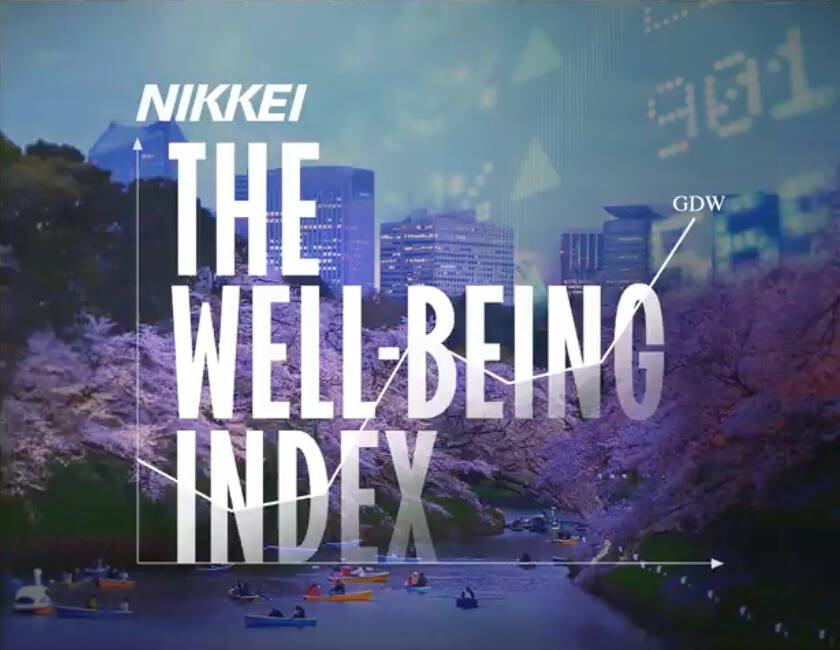
While the ‘Metaverse’ was the buzzword at Cannes in 2022, AI has by and large dominated every conversation this year. However, the two are not really in competition with each other since immersive experiences are at the same time the ‘what’ and the ‘where’ that define the trajectory consumer engagement is evolving towards, while on the other hand AI is a tool, a ‘how’ that can be applied to accelerate development in a number of fields, including the development of immersive experiences. In a Palais session titled ‘Building the Next Iteration of the Internet’, LEGO and Epic Games, publishers of Fortnite, teased aspects of their partnership centered around using Epic’s Unreal Engine technology to create virtual LEGO branded environments focused on establishing a kids friendly standard for the next iteration of digital experiences, honing in on age-gating, a commitment to steer away from ‘pay-to-win’ tactics that are in contrast with their ambition to democratize creativity, and an investment in deep content moderation and parental controls. The fruits of their collaboration will be open – as a point of reference, already today 40% of the content on Fortnite is created by users, rather than by Epic Games – and interoperable with other platforms. Immersive experiences continue to be one of the most powerful brand community-building opportunities out there – but communities need ‘heritage’, whether it’s rooted in history or in mythology. This insight is at the heart of Clash of Clans’ ‘Clash from the Past’, a campaign that was awarded the Grand Prix in Entertainment. The campaign revolves around a mockumentary developed to celebrate the mobile game’s fictional 40th anniversary, when in fact the game is only 10 years old. This ignited a series of activations paying homage to ‘vintage’ gaming aesthetics and reimagining the brand in the context of 80s, 90s, and early 2000s culture and business.
Building Brand Communities Through Immersive Experiences
In the early days of the digital revolution sustainability was perceived to be less of a priority. Now that sustainability transformation has, in a way, replaced digital transformation as the primary shift businesses are evolving to enable, purpose-driven brands are pivoting to a ‘digital for good’ mindset. Cannes Lions celebrated a great example of ‘digital for good’ this year, Lay’s ‘Smart Farm’, which was awarded a Bronze Lions in Innovation. Extreme and unpredictable weather conditions brought to bear by climate change are posing a threat to Indian agriculture, forcing farmers to inspect crops daily – an impossible task. As a contracting partner to over 27,000 farms in India Lay’s created a platform that uses satellite imagery, 4 years of data from 3,000 hectares of land and AI to deliver to farmers an early warning sign application they can easily consult on their mobile phones. It’s estimated that the solution reduced crop pandemic threats by 80%.
Other insights
When it comes to shaping a more sustainable world by engendering behaviors that preserve and regenerate our planet’s natural resources, a dentsu and Kantar research report focused on consumers in Asia Pacific found that while 98% of respondent said they are prepared to take action to live a more sustainable lifestyle, only 17% of them said they are actively changing their behaviors accordingly. It’s apparent that brands’ considerable sphere of influence needs to be used to drive behavior changes that close this intention-to-action gap that exist among consumers. Solar Impulse’s ‘Pret-a-Voter’, which was awarded Gold Lions in both the Print & Publishing and in the Direct categories, is a great example of closing this gap. This French NGO observed that, while there is no shortage of debate around the criticality of environmental sustainability among politicians, the legislative process is so cumbersome that seldom sufficient action is taken in time to address these issues. They thus produced a book where 50 environmental solutions were drafted as laws ready to be voted upon in the National Assembly and sent it to all its 577 members. Some of these resolutions have already been approved and others are in the Assembly’s forthcoming agenda.
Inequities in society exacerbate the crises the population faces at both a local and global level, including the environmental crisis. Dentsu and Nikkei inc. – the largest financial newspaper in the world - partnered with Harvard, Oxford, and Tokyo University to develop a transformative new way to measure a country’s growth, the Well-Being Index (GDW), taking into account indicators like employment, wages, work-life balance, housing, health, education, social connections, the natural environment, and the ease of raising children. The development of a more fair and open society requires a measurement tool to benchmark against and the GDW, used alongside the GDP, can help governments and companies make informed decisions while structuring their investments and policies. The Well-Being Index project also shows just how much an ecosystem approach is required to make significant strides in the sustainability agenda. The ’Well-Being Index’ was awarded a Gold Lions in the Business Transformation category.

For instance, 37% of Gen Zers associate “addressing mental health” to sustainability, while only 15% of Boomers do so. Cannes Lions is an opportunity for marketers to come together and not only celebrate the creative work that will hopefully inspire new, more sustainable consumer behaviors, but also look inwards and evaluate their own practices within the marketing and advertising supply chain in light of this new, broader definition of the industry’s sustainability mandate. As it was remarked in a dentsu Beach House session titled ‘Growth through Good: How Sustainable Business Practices Drive Growth’, sustainability is the new digital, in the sense that it’s the most important innovation opportunity at hand for brands and society today. The three core pillars of this wider sustainability mandate (and opportunity) that emerged from various discussions among industry leaders this week are: the need to shape a more environmentally sustainable world, the need to empower the rise of a more fair and open society, and the need to use the power of digital technologies for good.

Gallery
Watch our sessions in full and experience the insightful conversations with our people, partners and clients.
Panel session recordings

Addressing a Wider Sustainability Mandate
A fresh off the presses dentsu Consumer Navigator report shows that the definition of ‘sustainability’ is broadening.
Recordings
Gallery
Client connect
Recap
thursday 22 june
Highlights



